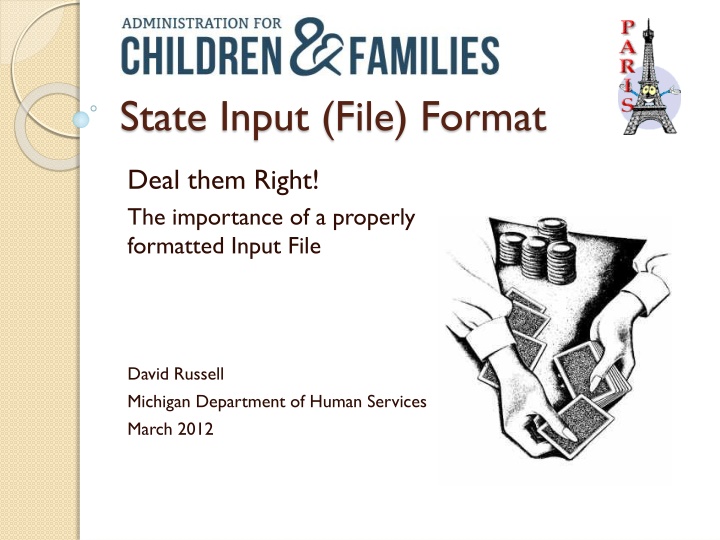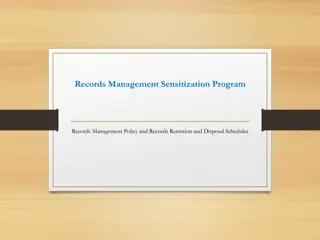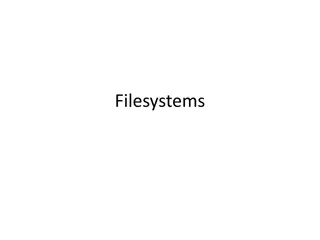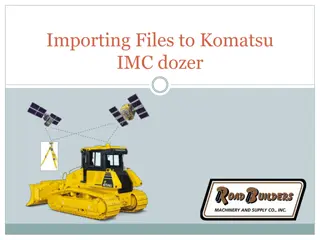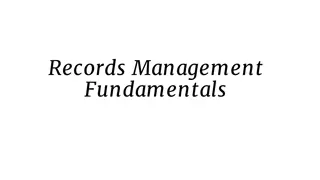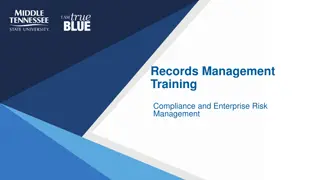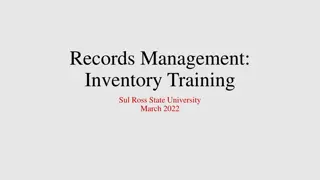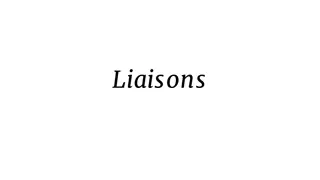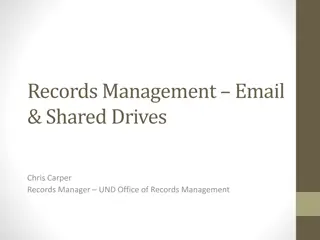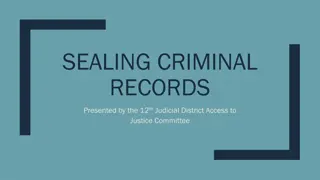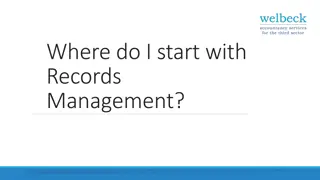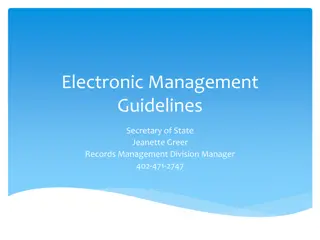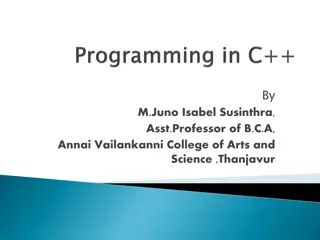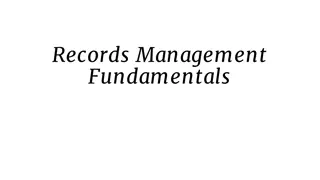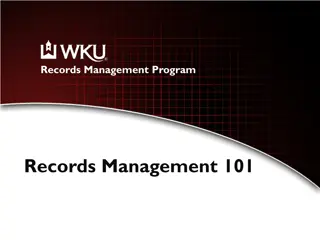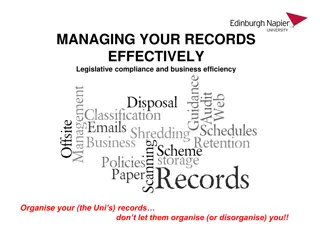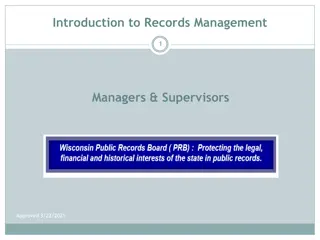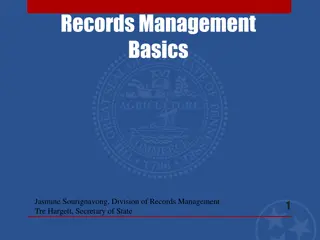Importance of Properly Formatted Input Files for State Records Management
Properly formatted input files are crucial for accurate data processing and sharing among states. Following the correct file format enhances data quality, improves matches by DMDC, and ensures efficient interstate data sharing. Dates and file date elements must be formatted correctly to avoid errors and inefficiencies in data processing.
Uploaded on Sep 14, 2024 | 3 Views
Download Presentation

Please find below an Image/Link to download the presentation.
The content on the website is provided AS IS for your information and personal use only. It may not be sold, licensed, or shared on other websites without obtaining consent from the author.If you encounter any issues during the download, it is possible that the publisher has removed the file from their server.
You are allowed to download the files provided on this website for personal or commercial use, subject to the condition that they are used lawfully. All files are the property of their respective owners.
The content on the website is provided AS IS for your information and personal use only. It may not be sold, licensed, or shared on other websites without obtaining consent from the author.
E N D
Presentation Transcript
State Input (File) Format Deal them Right! The importance of a properly formatted Input File David Russell Michigan Department of Human Services March 2012
The Input File Input file contains state records for any and all of the three matches. PARIS standardized file layout document can be found on the PARIS website. http://www.acf.hhs.gov/programs/paris/sys_info/index.html#fileformat
What are the Benefits? Improves the data returned to you after being matched by DMDC. Improves the data you are sharing with your fellow Member States/Territories on the Interstate match. Format must be followed, or errors will occur upon return, and with matches provided to other states.
Dates Whats the Big Deal? Many States use the start and end dates as a filter. Enter a start date and an end date for each program submitted.
File Date (Elements 49 -54) Follow the format: CCYYMM stands for the year and month of the quarterly match: E.g., May 2012 s file date is to be 201205 States that don t follow the format may have their records ignored by matching states
File Date: Part 2 Improper formatting hurts you and matching state: Out of criteria range for quarter (filtered out) If record duplicates a prior quarter s, it can error out the other state s batch process Do not submit old data! This include prior quarter(s) data Creates false hits and reduces efficiency
Start/End Dates: The Right Way(s) Option #1: Use the most recent program start date or the program start date for the current certification period. Use the end date of the current certification period. Options #2: Use the most recent program start date or the program start date of the current certification (same as #1). For the end date use 99999999 or 99991231 to indicate the program is still open.
Start/End Dates: Case Study August 2011 examples Individuals with: End dates, but no Start dates for programs marked as Y * No dates for programs marked as Y * Recent Start dates, no End dates, but marked as N for program Start and End dates prior to match quarter, but marked Y for program * Acknowledging these fields are optional.
The Importance of 198 Position 198 on the input file is the SSN Verification Indicator. Please submit verified SSNs on your input file. SSA s Verification Codes are OK to use. If left blank, some States filter these out as unverified.
The Importance of GOOD SSNs The first SSN received by DMDC is kept, all others with that number are dropped. The bad SSN, if received first will take over the spot for the state. Bad SSN s cause extra work for both states that match it.
What Goes in the State Optional Data: Positions 57-116? Whatever you need on your own returned records from all three matches. Some States use this to differentiate between agencies (for example the TANF/SNAP agency and the Medicaid agency if separate). Many states use this for internal system identifiers.
Mandatory / Optional Fields Complete ALL mandatory fields. DMDC needs them to properly process your file for each of the three matches you want to participate in States need them to properly process Interstate matches with your State. Contact information is especially important.
Speaking of Contact Information States need to distribute ALL contact information to staff: Phone (& extension*), Email, Fax Provides for best method to contact other state. Avoids calls to PARIS Admin. Staff posted on PARIS website. * Some States uses State Phone Extension field for PIN.
Ys and Ns If a Y/N field is mandatory, we expect to see one or the other (a character means the question was answered). Insert Y or null for each program (e.g., FS, MA, CC, etc.) Submit record only if recipient is open for at least one program. Exception is Child Care Indicator in position 321: Use P for Parent, C for Child and R for Provider.
Ys and Ns: Match Request Code To participate, at least one data match request field must be entered as Y in positions: 299 for VA file 300 for Interstate 301 for FED file Only mark Y if you have a signed MOA on file at ACF for the intended match DMDC tightened requirement: Old: N = No; All other entry = Yes New: Y = Yes; All other entry (or Null) = No If not Yes, no file is returned
Have I Stressed that Contact Information is Critical? Inaccurate contact information is the biggest complaint we hear from Member States. Accurate, up-to-date contact information is crucial to States when following up on the Interstate match. Provide as many contact options as possible: Email saves time for both states.
MA Contact Person Information Medical agency (MA) data is at the end of the input file (positions 446-495). Only having contact information for one agency presents a problem for states that administer programs in different agencies. The most common is TANF/SNAP in one agency and Medical in another agency.
Homework Assignment. Please go back to your state and give your input file a quality review. It will make the PARIS experience better for you, DMDC and your fellow member PARIS states, DC and Puerto Rico. This year s focus: DATES!
DMDC: Submitting your File Notify DMDC when you submit/transmit a file along with a record count. After transmitting the data electronically, promptly send an e-mail to the DMDC primary and secondary contacts: Portia Sullivan (primary) portia.sullivan@osd.pentagon.mil Donny Thao (secondary) donny.thao@osd.pentagon.mil Allows DMDC to expect and to check for your submitted file. You may request a receipt confirmation from DMDC. Some states track their own files transmission status and inform DMDC afterward so they don't need a receipt. Without any e-mail notices DMDC assumes those states are not participating, for that quarter, which is usually the case.
DMDC: Submitting Your File Part 2 Do not wait until the due date for each quarterly match which is the last date as to when PARIS data can be received; submitting early helps to reduce the IT traffic that you might encounter waiting till the last day. If a state will not make the quarterly file submission due date, contact DMDC prior to that date. They may be able to hold off the match process depending on the date. Plan your submission to incorporate the current (most up-to-date) data.
DMDC: Deal a great hand = Payoff! DMDC strives to return all data by the 10thof the month following the match. Therefore, if a member State is late with its data submission, that delay impacts everyone. We ask States to accomplish any internal coordination necessary to ensure that PARIS data is received at DMDC by the deadline date. DMDC can provide limited testing assistance for new file transmission methods via new state systems
Double Down: Hit the PARIS Website! File layouts Transmittals FAQ s Documented Best Practices State contacts (for match info) Administrative Contacts Board/Federal Partner Contacts
Questions? Hands shuffling a deck of playing cards. File Layout: David Russell, russelld3@michigan.gov DMDC: Donny Thao, donny.thao@osd.pentagon.mil Portia Sullivan, portia.sullivan@osd.pentagon.mil
